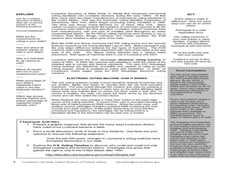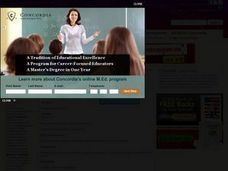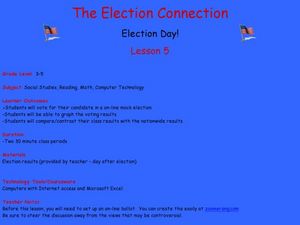Institute of Electrical and Electronics Engineers
Cast Your Vote
In a simple but unique lesson, youngsters learn about the history of voting systems. They then collaborate in groups to develop a new honest and consistent voting method. A class-wide poll is taken, evaluating the designs of other...
Brown University
The Candidates and Their Values: Election 2016
Voting for the next president of the United States is about finding the candidate who most closely aligns with your own values and sense of democracy. High schoolers become acquainted with the candidates from the 2016 election with a...
Teaching Tolerance
Why Local Elections Matter
Uncle Sam wants everyone to vote in local elections! Geared toward middle and high school scholars, the resource explores voter turnout and the importance of local elections. Academics participate in group discussion, complete...
Encyclopedia Britannica
Write an Election Day Letter
For some, getting to the polls to vote is no easy task. Voting may mean needing to choose between a job and civic duty. But what if Election Day was a national holiday? After reading an article about the pros and cons of designating...
Constitutional Rights Foundation
270 Votes to Win: The Electoral College in the United States
What exactly is the Electoral College and how does it work? The lesson is part of a larger series on government that explains what the Electoral College is and how it helps determine an election winner. Academics participate in...
Curated OER
Voting And Elections
Students examine the voting practices of the past several presidential elections while using data to determine the influence of different factors. They identify the reasons for high or low voter turnout and then display the outcome of...
Carolina K-12
Making First Vote Your Vote: Designing a Schoolwide Election
Encourage pupils to design an election plan for the entire school. They participate in a Board of Elections, create polling rules, discuss election controversies, write questions about the issues, run the election through an online...
Classroom Law Project
What are some of today’s voting issues? Voting in Oregon, youth vote, and technology
The youth vote. Rock the Vote. Vote-By-Mail. Electronic voting. Class members investigate issues facing today's voters, and the ways they have adapted over the years to optimize voter turnout.
John F. Kennedy Presidential Library & Museum
Red States/Blue States: Mapping the Presidential Election
Young historians investigate how voting patterns have changed by comparing the outcome of the 1960 election to the outcome of the recent election. A creative final assessment has participants making a news show wherein they provide...
Close Up Foundation
Teach the Vote
Why is voting important? A social studies unit presents a non-partisan approach to the importance of voting, to voting laws and procedures, and to resources that voters need to become informed voters.
C-SPAN
Foreign Interference in U.S. Elections
With election security looming large for 2020, pupils decide what should be done to protect them from foreign interference. A series of videos, including interviews with national security officials, elected representatives, and experts...
Curated OER
How We Vote
Students fill in a graphic organizer and discuss the struggles in groups about the history of voting in Louisiana. Students also explore a voting timeline to see who could and could not vote before and after 1850.
Curated OER
The Election of 1896 - Gold or Silver?
Learners analyze the issues behind the Election of 1896 and describe the positions of William McKinley and William Jennings Bryan. They evaluate editorial cartoons supporting McKinley's candidacy via editorial cartoons. Each student...
Curated OER
Validating Votes
Explore the discrepancies in Florida's vote counting process in 2000 and 2002 with this New York Times reading lesson. Middle schoolers study the viewpoints presented in informational text, paying attention to how word choice can...
K20 LEARN
Electoral College: Does My Vote Count?
How can a candidate get the most votes, yet still lose the race for the presidency? This is has happened more than once in American history, including in the elections of 2000 and 2016. Using an activity for creating group notes, young...
Curated OER
Special Interests: How Would A Legislator Vote?
Students act as elected officials who must make decisions that will make someone unhappy. They consider five bills that are up for vote in light of the contributions that many special-interest groups made to their campaigns. Students...
Curated OER
Why Vote? A Public Awareness Campaign
Students examine the structure of local government and determine why citizens vote. In this civics lesson, students listen to a lecture about the structure of local government and then encourage others to exercise their right to vote.
iCivics
Mock Election
Here is an excellent resource in which class members host a mock election for a candidate and policy that will be implemented into your very own classroom. Progressing from primaries, through the campaign trail, and finally to the mock...
Facing History and Ourselves
The Audacity of a Vote: Susan B. Anthony’s Arrest
Susan B. Anthony's speech "Is It a Crime for Women to Vote?" takes center stage in a instructional activity that asks class members to consider how they might respond to what they consider an unjust law. Groups work through the speech...
Curated OER
Your Vote Counts!
Young scholars build an election campaign around their favorite TV characters. They acquire knowledge about candidates, slogans, qualifications, and voting using the activities in this lesson. Thus, they simulate the election process.
Curated OER
Inform Your Vote
Students examine and participate in the election process, analyze current event topics and offer their opinions. They then share their viewpoints on civic issues. They are encouraged to do additional research on the election's hot issues.
Curated OER
Voting Simulation
Students explore the process of voting. They study the lawmaking branch of the state government.
Curated OER
Youth voters and election turnout
Students investigate why 18- to 24- year-olds have a low turnout at the polls. Students develop a plan to encourage young Americans to vote, or write a persuasive essay telling why they should vote.
Curated OER
The Election Connection
Students participate in a mock election. In this election lesson plan, students vote online in a mock election, graph the results, and compare their results to the nationwide results.

























